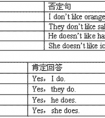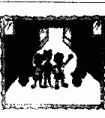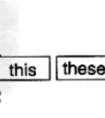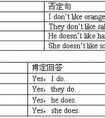用所给单词的正确形式填空。1. Whatare(this)?2.Let's(have) abigball.3.Here (be)theanswers.4.What (do) shespeakinthiscountry?5.Where(be)theyfrom?6.Austr-五年级英语
人物
friend boy girl mother father sister brother uncle man woman Mr Miss lady mom mother dad father parents
grandparents grandpa grandma aunt cousin son classmate principal university student pen pal pal people
职业
teacher student doctor nurse driver farmer singer writer actor actress artist TV reporter engineer
accountant policeman salesperson cleaner baseball player assistant policeman
颜色
red blue yellow green white black pink purple orange brown]
食品
rice bread beef milk water egg fish tofu cake hot dog hamburger noodles meat
chicken pork mutton vegetable soup ice-cream Coke juice tea coffee (breakfast lunch dinner)
水果,蔬菜
apple banana pear orange watermelon grape eggplant green beans tomato potato peach cucumber strawberry onion carrot cabbage
衣服
jacket shirt T-shirt skirt dress jeans pants socks shoes sweater coat shorts sneakers slippers sandals boots hat
交通工具
bike bus train boat ship car taxi yacht taxi jeep van plane subway motor cycle
杂物
window door desk chair computer board fan light teacher's desk picture wall floor curtain trash bin closet mirror end table
football present lamp phone sofa shelf fridge table air-conditioner photo plate knife fork spoon ball kite box violin e-card e-mail traffic light money medicine
地点
home room bedroom bathroom living room kitchen classroom school park library post office hospital cinema bookstore
farm zoo garden study playground canteen teacher's office gym washroom art room company factory fruit stand pet shop nature park theme park bank village city
国家
China/PRC America/USA England Canada/CAN
天气
cold warm cool snowy sunny hot rainy windy cloudy weather reporter
景物
river lake stream forest path raod house bridge building rain cloud sun mountain sky
植物
flower grass tree seed sprout plant leaf
星期
day Monday Tuesday Wednesday Thursday Friday Saturday Sunday weekend
月份
month January February March April May June July August September October November December year
季节
spring summer fall(autumn) winter
方位
south north east west left right
患病
have a fever hurt have a cold have toothache have a headache have a sore throat
数词
One two three four five six seven eight nine ten eleven twelve thirteen fourteen fifteen sixteen seventeen eighteen nineteen
twenty thirty forty fifty sixty seventy eighty ninety first second third fourth fifth eighth ninth twelfth twentieth
形容词
big small long tall short young old strong thin active quiet nice kind strict smart funny tasty sweet salty sour fresh favourite
clean tired excited angry happy bored sad fine great heavy new fat happy right little lovely beautiful colourful pretty cheap expensive sick better
介词
in on under near behind next to over in front to from to for
代词
I me my we us our you your he him his she her it its they them their
动词
Play swim skate fly jump walk run climb fight swing eat like have turn buy take live teach go study learn sing dance row do homework watch TV read books cook the meals water the flowers sweep the floor clean the bedroom make the bed set the table wash the clothes do the dishes use a computer do morning exercises eat breakfast eat dinner go to school have English class play sports get up climb mountains go shopping play the piano visit grandparents go hiking fly kites make a snowman plant trees draw pictures cook dinner read a book answer the phone listen to music clean the room write a letter write an e-mail drink water take pictures watch insects pick up leaves do an experiment catch butterflies count insects collect insect collect leaves write a report play chess have a picnic get to ride a bike play the violin make kites collect stamps meet welcome thank work look help pass show use clean open close stop wait drive send feel become think wear put on go home go to bed play computer games do housework empty the trash put away the clothes get off(on) take a trip go on a trip read a magazine go to the cinema
疑问词
what(什么) what colour(什么颜色) what time(几点)
what day(星期几) how(怎样)how old(年龄多大,几岁)
how many(多少) how much (多少钱) how tall (多高)
how heavy(多重) how long(多长) how big(多大) how large(面积多大) who(谁) when(什么时候)
whose (谁的) where(在哪里) why(为什么)
which(哪一个)
be动词
am is are was were
助动词:do does did
情态动词
can should would will
考点名称:系动词
- 系动词:
亦称连系动词,作为系动词,它本身有词义,但不能单独用作谓语,后边必须跟表语,亦称补语(形容词),构成系表结构说明主语的状况、性质、特征等情况。
be(是)是最基本的系动词。小学涉及到的系动词需要掌握的am, is, are
如:I am from Beijing. 我来自北京。
My mother is a teacher. 我的妈妈是一位老师。
除了系动词be,常用的系动词还有look(看起来)、sound(听起来)、feel(感觉到)、become(变成)、smell(闻起来)等。
例:The boy looks very happy. 这个男孩看起来很高兴。
The dish smells good. 这盘菜闻起来很香。 be动词意思和用法:
一般的意思是:
是,此种用法,有多种变化形式,is,am,are,was,were,being,been,to be.
另外,be动词还有成为的意思。
根据句子中不同的人称、数和时态,应该选择相应的be动词。<?xml:namespace prefix = "o" ns = "urn:schemas-microsoft-com:office:office" />要看句语的时态:
如果是一般过去时,就用was/were
如果是一般现在时,就用am/is/are
如果是一般将来时,就用will be
然后看主语的人称及复数形式:
一般过去时:
第一人称和第三人称的单数形式,则用was
第一人称和第二人称、第三人称的复数,则用were
一般现在时:
第一人称单数形式,用am
第三人称单数形式,用is
第一人称复数、第二人称、第三人称的复数形式,则用are
一般将来时:
- 最新内容
- 相关内容
- 网友推荐
- 图文推荐
上一篇:—— It'sachair.[ ]A.What'syourname?B. Thisisachair?C. What'sthis?-三年级英语
下一篇:myfavouriteschoolwork.[ ]A.ThatB./C.That's-四年级英语
零零教育社区:论坛热帖子
| [家长教育] 孩子为什么会和父母感情疏离? (2019-07-14) |
| [教师分享] 给远方姐姐的一封信 (2018-11-07) |
| [教师分享] 伸缩门 (2018-11-07) |
| [教师分享] 回家乡 (2018-11-07) |
| [教师分享] 是风味也是人间 (2018-11-07) |
| [教师分享] 一句格言的启示 (2018-11-07) |
| [教师分享] 无规矩不成方圆 (2018-11-07) |
| [教师分享] 第十届全国教育名家论坛有感(二) (2018-11-07) |
| [教师分享] 贪玩的小狗 (2018-11-07) |
| [教师分享] 未命名文章 (2018-11-07) |





